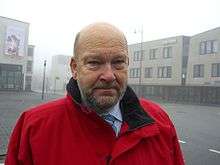Hans Monderman
Hans Monderman (19 November 1945 – 7 January 2008)[1][3] was a Dutch road traffic engineer and innovator. He was recognized for radically challenging the criteria used to evaluate engineering solutions for street design. His work compelled transportation planners and highway engineers to look afresh at the way people and technology relate to each other.[4]
Hans Monderman | |
|---|---|
 | |
| Born | 19 November 1945 |
| Died | 7 January 2008 (aged 62) |
| Nationality | Dutch |
| Occupation | Traffic engineer |
| Known for | Shared space, road engineering |
| Notes | |
His design approach is the concept of "shared space", an urban design approach that seeks to minimise demarcations between vehicle traffic and pedestrians, often by removing features such as curbs, road surface markings, traffic signs, and regulations. Monderman found that the traffic efficiency and safety improved when the street and surrounding public space was redesigned to encourage each person to negotiate their movement directly with others.[5]
Shared space
Monderman took it as a given that for several generations, motorized traffic will remain an essential feature of European economies and their spatial fabric; in effect, he has taken this as his technical and policy target—a problem that simply will not go away. Against this background, he reviewed technologies and practices of street design, and stripped away those he felt insufficient or counterproductive. One of the better known of Monderman's accomplishments is the Dutch Woonerf, or "Living Street" project, which originated from a basically unplanned citizen initiative in Delft in 1968.
Career highlights
- 1969: Province of Fryslân, civil engineer project leader infrastructure constructions and controller traffic safety
- 1979 consultant traffic safety at Regional Traffic Safety Commission (accident analysis, road engineering, speed reduction measures); from then on developing and bringing into practise on several spots in Province of Fryslân shared space approach
- 1996 part-time traffic planner municipality of Smallingerland (Fryslân)
- 1999 to 2002 policy consultant province of Groningen (integration of traffic and landscape)
- 2002 programme manager of integration programme (spatial, landscape, and traffic planning) in Drenthe
Honours
Monderman received an Honorary Doctor of Philosophy degree in traffic planning for outstanding achievements in the fields of traffic engineering, urban design, and project management.
In 2005 he was nominated for the World Technology Award for the Environment[6] and gave a presentation on his work in a speech to the formal conference and awards ceremony in October 2005 in San Francisco.[7]
References
- "Hans Monderman". Obituaries. London: Times Newspapers Ltd. 2008-01-11. Archived from the original on 2008-05-12. Retrieved 2018-01-16.
- Ben Hamilton-Baillie (2008-02-02). "Hans Monderman". Obituaries. The Guardian. Retrieved 2008-02-05.
- "Condolence Register, Hans Monderman". Shared Space project. Archived from the original on 2008-01-16.
- "Letter of nomination, Award for Environment". 2005 World Technology Awards. Archived from the original on 2008-01-06.
- "Signing Off: Visionary Traffic Planners". Urbanite Baltimore. Archived from the original on 2008-01-20.
- "Environment Nominees: New Fellows". 2005 World Technology Summit.
- "Presentation Webcast, Hans Monderman". 2005 World Technology Summit. Archived from the original on 2008-01-20.
External links
- A brief biography New Mobility Agenda
- About Shared Space Shared Space Institute, Drachten, The Netherlands
- Obituary in The Guardian
- "The Traffic Guru" by Tom Vanderbilt, The Wilson Quarterly
- Sarah Lyall (2005-01-22). "A Path to Road Safety With No Signposts". New York Times.
- McNichol, Tom (December 2004). "Roads Gone Wild". Wired (12.12).
- Hans Monderman (January 2006). Tour of Shared Space in Drachten (YouTube) (Video, 10 parts). tequio. Retrieved 2008-02-22.
- Hans Monderman (2007-11-13). Designing Shared Space (mov) (Video, 57:33). Urban Design London. Masterclass 7. Retrieved 2008-02-22.